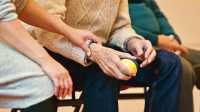 One of the most difficult conversations that you will need to have with your aging parents throughout their retirement is about the future. Though no matter how difficult this conversation may be, it is vital that you can plan for what might happen as a family to ensure that you are prepared for anything that comes your way. If you are struggling to do this, here are some top tips to help you comprehensively plan for your parent’s future, so they can have the most comfortable lives possible, and you do not have to worry for them.
Here are some to do lists to help you get started:.
One of the most difficult conversations that you will need to have with your aging parents throughout their retirement is about the future. Though no matter how difficult this conversation may be, it is vital that you can plan for what might happen as a family to ensure that you are prepared for anything that comes your way. If you are struggling to do this, here are some top tips to help you comprehensively plan for your parent’s future, so they can have the most comfortable lives possible, and you do not have to worry for them.
Here are some to do lists to help you get started:.
1. Look at Assisted Living Facilities
Although you might believe that your parents will always be healthy enough to live at home, this is not always the case. There are many common health conditions such as dementia, which may leave your parents needing round-the-clock care, as well as general ill health and frailty as they start to show the signs of aging. To make sure that you know that your parents are well-looked after when the time comes, you should consider researching assisted living facilities now. This will allow you to relax in knowing that both you and your loved one are happy with the home you have chosen for them. For instance, if you are looking for
assisted living Fort Lauderdale, Belmont Village can offer your parents a range of care options, and you can rest in the knowledge that they are being cared for.
2. Sort Their Finances
Many adult children leave their parents to handle their finances
for fear of taking over or looking greedy when it comes to their eventual passing. However,
helping your parents sort their finances out now can ensure that they will be able to pay for all of the medical care they may need and ensure that they have enough money to live on until the end of their lives. Sorting these finances out early, such as looking at the pension schemes and organizing the assets they have to their name, will ensure that they do not come unstuck later and enable them to set a budget around their financial situation.
3. Create a Will
Although it is easy to dismiss probate as something that you do not want to think about or discuss with your parents,
helping them create a will and knowing what is inside of it is important if they pass away suddenly and unexpectedly, then you can help them to make a will by contacting a solicitor or encouraging them to complete a DIY will-making kit. You should always make sure that DIY wills are legally valid, though. Knowing what is inside of the will can be important so that you can make sure that their wishes are carried out on their death and that no forgery or other issues occur.
(more…)










